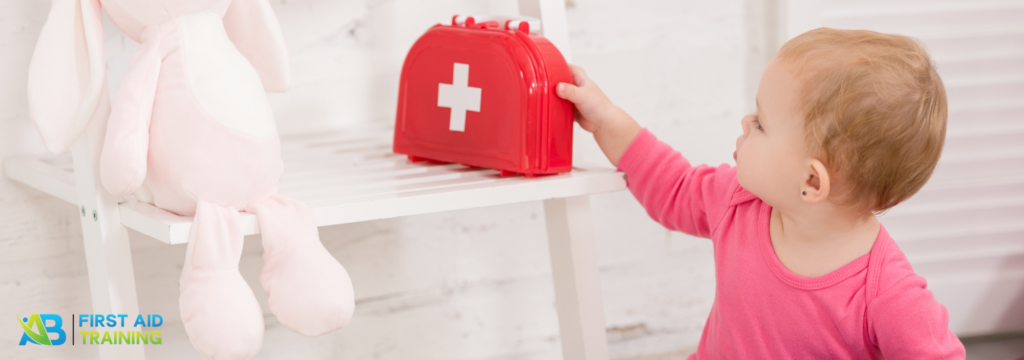Working in early childhood education is incredibly rewarding — but it also comes with significant responsibility, especially when it comes to health and safety. When you’re caring for babies, toddlers, and young children, emergencies can happen fast — and often when you least expect them.
That’s why childcare workers need more than just a basic understanding of first aid. They need hands-on training, real confidence, and the ability to act quickly under pressure.
This guide outlines the key first aid skills every childcare educator, assistant, and support staff member must know — and how to ensure your centre stays compliant with Australian regulations and best practice.
Children are curious, energetic, and still learning their physical boundaries. This makes childcare environments high-risk settings for injuries, allergic reactions, and medical emergencies.
According to Safe Work Australia, early childhood educators experience some of the highest rates of workplace incidents involving children, including:
- Choking and breathing difficulties
- Head injuries from falls
- Allergic reactions
- Burns and scalds
- Seizures or febrile convulsions
- Asthma attacks
- Cuts, bruises, and fractures
In these situations, knowing exactly what to do — not just in theory but in practice — can make all the difference.
Mandatory First Aid Requirements for Childcare in Australia
Under the Education and Care Services National Regulations, all childcare services must ensure:
- At least one staff member with current, approved first aid qualifications is in attendance at all times
- That staff are trained in anaphylaxis management and emergency asthma response
- All qualifications are kept up to date, with CPR refreshed every 12 months
The most commonly required courses include:
- HLTAID012 – Provide First Aid in an Education and Care Setting
- HLTAID009 – Provide Cardiopulmonary Resuscitation (CPR)
- HLTAID011 – Provide First Aid
- 22578VIC – Course in First Aid Management of Anaphylaxis (if applicable)
The Must-Have First Aid Skills for Childcare Workers
Here are the core skills your staff must not only learn — but feel confident performing in a real emergency:
1. CPR (Cardiopulmonary Resuscitation)
Performed on infants, children, and adults
Using correct compression techniques for each age group
Including the use of an AED (defibrillator)
2. Choking Response
Back blows and chest thrusts for babies
Abdominal thrusts for older children
Monitoring for airway obstruction and breathing difficulty
3. Asthma Emergency Management
Identifying the signs of an asthma attack
Using spacer devices and Ventolin
Following individual asthma action plans
4. Anaphylaxis Response
Recognising signs of severe allergic reactions
Administering EpiPen and Anapen confidently
Following ASCIA Action Plans and calling emergency services
5. Bleeding and Wound Care
Controlling bleeding
Bandaging and immobilising
Knowing when to escalate or contact parents
6. Burns and Scalds
Cooling techniques (20 minutes of cool running water)
When to cover, when to refer
Managing burns from hot drinks, food, heaters, and sun exposure
7. Head Injuries and Falls
Identifying red flags for concussion
Monitoring children post-injury
Recording and reporting procedures
8. Febrile Convulsions and Seizures
Keeping the child safe during a seizure
When to administer emergency medication (if applicable)
Noting seizure duration and communicating with families
Why Hands-On Training Is Critical
While online modules and presentations have their place, first aid is a practical skill — and it must be learned through hands-on training and repeated practice.
At AB First Aid, we focus on:
- Small group, practical sessions
- Trainer devices for EpiPen, Anapen, and asthma spacers
- CPR on infant and child manikins
- Realistic, childcare-focused scenarios
- Support for educators who speak English as a second language
Because when it comes to children’s safety, there’s no room for guesswork.
How Often Should Training Be Updated?
Skill/Qualification | Update Frequency |
CPR (HLTAID009) | Every 12 months |
First Aid (HLTAID012) | Every 3 years |
Anaphylaxis & Asthma | Every 3 years (or as directed by state authority) |
Emergency Briefings (e.g. for schools) | Twice per year |
Why Centres Across Victoria Choose AB First Aid
- Nationally accredited training that meets ACECQA requirements
- Trainers with real-world experience in childcare and education
- We come to your centre, anywhere in Victoria
- Practical, supportive, and inclusive training style
- Clear records, reminders, and compliance support for directors and managers
We make first aid easy, hands-on, and compliant — and we specialise in working with early childhood teams.
Ready to Book or Learn More?
Keep your team confident, compliant, and ready to respond.
Contact AB First Aid:
Email: info@abfirstaid.com.au
Phone: 03 8364 8984
Website: www.abfirstaid.com.au
Serving childcare centres and educators across Melbourne and regional Victoria.


